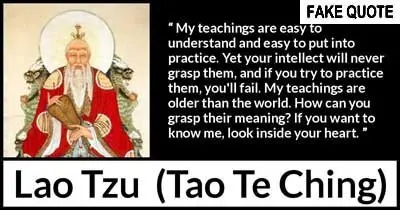|
Tao Te Ching
THE TAOISM OF LAO TZU
|
Fake Lao Tzu Quote"My teachings are easy..."
This is NOT a quote from Tao Te Ching:"My teachings are easy to understand and easy to put into practice. Yet your intellect will never grasp them, and if you try to practice them, you'll fail. My teachings are older than the world. How can you grasp their meaning? If you want to know me, look inside your heart."
These pompous and arrogant words are far from the mentality of Lao Tzu. What the quote says is that we should all give it up, because we have no chance to grasp the message. Instead we should settle for looking inside our hearts. Under these circumstances, what can we expect to find there but despair? There is a contradiction between the first line about the teachings being easy to understand, and the following lines dismissing our ability to do so. Lao Tzu liked to use paradoxes, but not contradictions. Also, he warned repeatedly against showing off and putting oneself above others.
What Lao Tzu states is not that people try and fail, but that they don't even try because they don't understand. Why would one even try to practice something one doesn't understand? The lines are not a doom on human capacity, but on our awareness. A modern wording would be something like: we don't know what's best for us. That is what Lao Tzu explains in the following lines. He understands because he is connected to the origin and sovereign, which is Tao, the Way. Those who have no connection with Tao are unable to understand Lao Tzu when he speaks about it or acts in accordance with it. If they were to grasp it, and Lao Tzu does not deny the possibility, they would understand him. The quote examined here, on the other hand, doesn't grant people that option. It states bluntly that we are unable to grasp the meaning. If so, what would be the point of even trying? In the last two lines, the quote suggests that Lao Tzu would still be possible to know, if we look into our hearts. The symbolic meaning of the heart differs between the East and the West. To the former, it signifies the mind and will-power, whereas to us it is mainly about emotions — especially in an expression of this kind. It claims that we should search our feelings for the answer. Lao Tzu would not agree. Tao is something for the mind to ponder and discover. The end of the chapter deals not with how to understand him, but with the value he possesses by his insight — and that he should still be modest. The quote discussed here omits this, elevating Lao Tzu to something akin to a deity. The quote is from Stephen Mitchell's 1988 version of Tao Te Ching (page 70), which has been a bestseller for many years. It is very popular for its elegant and straightforward text. Unfortunately, it frequently deviates quite a lot from Lao Tzu's words and the standard interpretations, as can be found in my discussions of several other flawed Lao Tzu quotes coming from his book. For more about Stephen Mitchell and his version of Tao Te Ching, see the chapter A good traveler has no fixed plans.
Stefan Stenudd September 18, 2020.
More Fake Lao Tzu QuotesThere are many more fake Lao Tzu quotes examined on this website. Click the header to see a list of them.
Fake interview with the authorClick the header to read a "fake" interview with Stefan Stenudd, the author of Fake Lao Tzu Quotes.
About CookiesMy Other Websites:I Ching OnlineThe 64 hexagrams of the Chinese classic I Ching and what they mean in divination. Try it online for free.
Qi Energy ExercisesThe ancient Chinese life energy qi (chi) explained, with simple instructions on how to exercise it.
Life EnergyThe many ancient and modern life force beliefs all over the world explained and compared.
Taoismen på svenska
Other Books by Stefan StenuddClick the image to see the book at Amazon (paid link).
The Greek philosophers and what they thought about cosmology, myth, and the gods. |
 Tao Te Ching
Tao Te Ching Now it's a book, too!
Now it's a book, too! Tao Quotes
Tao Quotes Cosmos of the Ancients
Cosmos of the Ancients Qi — Increase Your Life Energy
Qi — Increase Your Life Energy Aikido Principles
Aikido Principles Life Energy Encyclopedia
Life Energy Encyclopedia Archetypes of Mythology
Archetypes of Mythology Stefan Stenudd
Stefan Stenudd